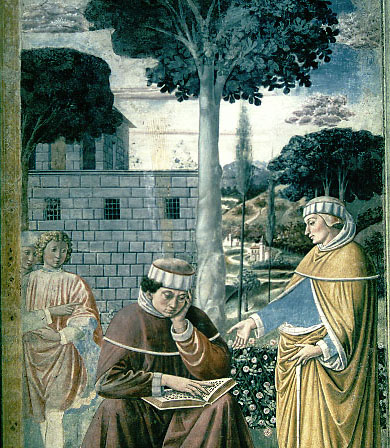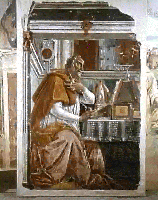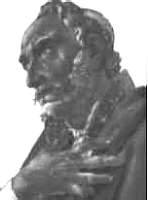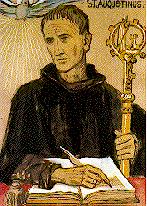Allgemein
Augustinus
Homepage
Herzlich willkommen auf der Homepage des Heiligen Augustinus!
Gestalt
und Werk Augustins – eine Hinführung
von Prof. Dr. Dr. Cornelius Mayer
Inhaltsverzeichnis:
|
http://www.augustinus.de/
Augustinus
als Ordensvater
http://www.tirnet.de/~sgottlie/inhalt4.htm
Mnemotechnik,
Augustinus und die Schrift
Jörg Ossenkopp - ossnkopp@inf.fu-berlin.de
Zu Anfang möchte ich eine Rekonstruktion der antiken
Mnemotechnik versuchen. Da es sich bei der Mnemotechnik tatsächlich
um eine Technik handelt und nicht um einen künstlerischen
Inhalt oder einen literarischen Topos, kann man meine
Rekonstruktion als Gebrauchsanweisung verstehen. Der Haupttext
für eine Rekonstruktion der Mnemotechnik ist die Rhetorica ad
Herennium, deren Autor anonym ist - dieser Text ist selbst
eine Gebrauchsanweisung für das künstliche Gedächtnis,
unter anderem. Herennius, an den die Rhetorica ad Herennium
gerichtet ist, soll sich nun Orte und Bilder einprägen.
Welche
Verbindungen kann man zwischen Augustinus und den alten Gedächtnistechniken
ziehen? Augustinus hat in Madaura und Karthago Rhetorik
studiert, war dann selbst Rhetoriklehrer und schließlich
Stadtrhetor von Mailand. Die Gedächtnistechniken gehoeren als
integraler Bestandteil zur Rhetorik, sie sind beschrieben
nicht nur in der Rhetorica ad Herennium, sondern auch von
Quintilian in der Institutio oratoria, Cicero und sogar schon
Aristoteles scheinen sie als bekannt vorauszusetzen.
So ist es zumindest sehr wahrscheinlich, daß Augustinus als
professioneller Redner bekannt mit den Regeln der Mnemotechnik
war, auch wenn in seinem Werk nirgends direkt darauf Bezug
genommen wird. Um jetzt nicht vorschnell zu urteilen, sollte
man einen genaueren Blick auf die Schriften des Augustinus
werfen. Ich moechte mich hier auf die Confessiones beschränken,
denn dieses Werk scheint zentrale Stellen fuer die
augustinische Gedaechtniskonzeption zu enthalten.
http://www.inf.fu-berlin.de/~ossnkopp/augustinus.html
Augustinus
und der Manichäismus
Thomas Freibott
Augustinus von Hippo Regius
war ein unermüdlicher Kämpfer gegen den Manichäismus.
Der Prozeß seiner geistigen Auseinandersetzung mit dieser
Sekte dauerte bis Anfang des 5. Jahrhunderts n.Chr.
Durch seine
zahlreichen Schriften gegen diese Irrlehre verfolgte er ein apologetisches
Anliegen: Er zeigte auf, daß die Wahrheit allein in der
katholischen Religion zu finden ist und nicht in einer
Mani-Gemeinde, wie er es zuvor glaubte. Bis zu seiner
Bekehrung war er neun Jahre lang (als "Hörer",
nicht als "Auserwählter") dem Manichäismus
verfallen.
http://www.stjosef.at/dokumente/manichaeismus_freibott.htm
St.
Augustine of Hippo
Jack Pejza
Considered to be one of the most outstanding theologians in
the history of the Catholic Church, Augustine was born in
North Africa in 354 A.D. and died there in 430. There are a
great many web pages devoted to him and his thought. This page
will attempt to categorize and list as many as have been found.
http://www.geocities.com/Athens/1534/august.html
Teaching
of St. Augustine of Hippo
St. Augustine of Hippo (354-430) is "a philosophical and
theological genius of the first order, dominating, like a
pyramid, antiquity and the succeeding ages. Compared with the
great philosophers of past centuries and modern times, he is
the equal of them all; among theologians he is undeniably the
first. We shall treat of his teaching and influence in three
sections:
http://www.newadvent.org/cathen/02091a.htm
|
Biographie
DER
HEILIGE AUGUSTINUS, ORDENSVATER, BISCHOF, KIRCHENLEHRER
(354-430)
© P. Lukas Schmidkunz OSA - lukas@augustiner.de
Nach langem inneren Kampf gab Augustinus, im Alter von 33
Jahren seinen Lehrstuhl der Rhetorik an der Schule von Mailand
auf und zog sich im Herbst 386 auf das Landgut des Verecundus,
eines Mailänder Kollegen, bei Cassiciacum zurück. Dort
verbrachte er in Gemeinschaft mit seiner Mutter Monika und
einigen Freunden mehrere Monate in fruchtbarer geistiger und
seelischer Tätigkeit. Anfangs der Fastenzeit 387 kehrte er
nach Mailand zurück, um sich zusammen mit seinem Sohn
Adeodatus und seinem Freund Alipius auf die Taufe
vorzubereiten. Es besteht kaum ein Zweifel, daß er sie am
Karsamstag desselben Jahres empfing.
Die Erfahrung des gemeinsamen Lebens mit gleichgesinnten
Gottsuchern zu Cassiciacum hatte in ihm die Überzeugung
geweckt, daß er berufen sei, in Gebet und Arbeit in klösterlicher
Stille Christus zu dienen. Mit diesem Ziel vor Augen kehrte er
nach Afrika zurück. Doch in Ostia
starb seine Mutter. Dadurch verzögerte sich seine Heimkehr
ein ganzes Jahr. Er verbrachte dieses Jahr in Rom sehr
nutzbringend damit, daß er die Manichäer entlarvte und das
Klosterleben in Rom kennenzulernen suchte. Nach seiner Ankunft
in Tagaste
gegen Ende 388 gründete er mit einigen Freunden auf einem
Besitz, den er von seinen Eltern geerbt hatte, eine
Gemeinschaft von Laienmönchen. Die drei Jahre, die er dort
verbrachte, waren die glücklichsten seines Lebens. Von
Tagaste aus verbreitete sich der Ruf seiner Frömmigkeit und
Gelehrsamkeit. Bei einem Besuch in Hippo
Regius im Jahre 391 verlangte die dortige Christengemeinde
einstimmig, daß er für ihre Geschäfts- und Hafenstadt zum
Priester geweiht werde. Er empfing vom bejahrten Bischof
Valerius die Priesterweihe und drei Jahre später die
Bischofsweihe. Er war zunächst Hilfsbischof des Valerius,
nach dessen Tod, wahrscheinlich im Jahre 396, wurde er Bischof
von Hippo.
Dieses neue, verantwortungsvolle Amt verleitete Augustinus
nicht dazu, sein Klosterideal aufzugeben. Bis zu seiner
letzten Stunde lebte er treu nach seiner klösterlichen
Lebensregel. Jahrhunderte später kam das Klosterideal
Augustins zu voller Entfaltung, als zahlreiche
Ordensgemeinschaften die Augustinusregel
annahmen.
http://www.augustiner.de/vita.htm
Das
Leben des heiligen Augustinus
Beschrieben
von seinem Freunde Bischof Possidius
Gott, der Schöpfer
und Lenker aller Dinge, gab mir den Gedanken zur Abfassung
dieser Schrift. Es trieb mich auch mein längst gefaßter
Entschluß, mit der Gnade des Erlösers dem allmächtigen und
dreeinigen Gott im Glauben zu dienen. Wie Früher als Laie
schon, so bin ich heute als Bischof erst recht gewillt, mit
meinen gottgeschenkten Geistesanlagen und Redegaben zur
Auferbauung der heiligen und wahren katholischen Kirche
unseres Herrn Jesus Christus zu wirken. Das läßt mich nicht
schweigen vom Lebensgang und Lebenswandel des gotterwählten
und zur rechten Zeit auf den Leuchter erhobenen, unübertroffenen
Priester Augustin. Was ich persönlich an ihm gesehen und aus
seinem Munde gehört habe, will ich hier erzählen.
http://www.augustiner.de/possid/possid.htm
Aurelius
Augustinus (354 - 430)
Der Philosoph
und Theologe Augustinus wurde in Karthago in Rhetorik
ausgebildet und im Jahr 374 Lehrer in diesem Fach. 383 wurde
er nach Rom berufen und kurz danach in die Residenzstadt
Mailand, wo er als Rhetor wirkte.
Die Krisen
seiner Jugend hat Augustinus um 397/401 in seinen
Bekenntnissen niedergeschrieben. Die Bekenntnisse sind eine
der ersten individualistischen Selbstbiographien der
Weltliteratur.
Für Augustinus
lassen sich Theologie und Philosophie nicht scharf
unterscheiden. Diese Position zeigt sich u. a. in seiner
Maxime: Ich glaube, damit ich erkennen kann (lat. credo,
ut intelligam).
Augustinus knüpft
an Platon's
Unterscheidung zwischen der veränderlichen Erscheinungswelt
und der ewigen, unveränderlichen Ideenwelt der Vernunft
an. Er greift Platons Gedanken, daß nur das Wirkliche voll
und ganz erkannt werden kann, und Platons Dualismus zwischen
Seele und Leib auf.
Augustinus
vertrat die Lehre von der Prädistination, wonach der Mensch
zur Seligkeit oder zur Verdammnis von Gott
vorausbestimmt ist.
http://www.philosophenlexikon.de/augustin.htm
Saint
Augustine
Michael Mendelson - mhm4@lehigh.edu
Aurelius
Augustinus [more commonly "St. Augustine of Hippo,"
often simply "Augustine"] (354-430 C.E.): rhetor,
Christian Neoplatonist, North African Bishop, Doctor of the
Roman Catholic Church. One of the decisive developments in the
western philosophical tradition was the eventually widespread
merging of the Greek philosophical tradition and the
Judeo-Christian religious and scriptural traditions. Augustine
is one of the main figures through and by whom this merging
was accomplished. He is, as well, one of the towering figures
of medieval philosophy whose authority and thought came to
exert a pervasive and enduring influence well into the modern
period (e.g. Descartes and especially Malebranche), and even
up to the present day, especially among those sympathetic to
the religious tradition which he helped to shape (e.g.
Plantinga 1992; Adams 1999). But even for those who do not
share this sympathy, there is much in Augustine's thought that
is worthy of serious philosophical attention. Augustine is not
only one of the major sources whereby classical philosophy in
general and Neoplatonism in particular enter into the
mainstream of early and subsequent medieval philosophy, but
there are significant contributions of his own that emerge
from his modification of that Greco-Roman inheritance, e.g.,
his subtle accounts of belief and authority, his account of
knowledge and illumination, his emphasis upon the importance
and centrality of the will, and his focus upon a new way of
conceptualizing the phenomena of human history, just to cite a
few of the more conspicuous examples.
http://plato.stanford.edu/entries/augustine/
 Augustine
of Hippo Augustine
of Hippo
J.J. O'Donnell
Augustine of Hippo (354-430 AD) took great pains to create and
project a powerful image of himself beyond the churches and
towns where he wrote and taught in Roman north Africa. He
succeeded in this self-presentation beyond his wildest dreams.
http://ccat.sas.upenn.edu/jod/augustine.html
Life
of St. Augustine of Hippo
(See also
WORKS OF
SAINT AUGUSTINE and TEACHING
OF SAINT AUGUSTINE)
The great St.
Augustine's life is unfolded to us in documents of unrivaled
richness, and of no great character of ancient times have we
information comparable to that contained in the "Confessions,"
which relate the touching story of his soul,
the "Retractations," which give the history of his mind,
and the "Life of Augustine," written by his friend Possidius,
telling of the saint's apostolate.
http://www.newadvent.org/cathen/02084a.htm
Augustine
Richard Hines - hinesric@wsunix.wsu.edu
 Augustine
was born to a pagan father and a Christian mother in the North African
city of Tagaste; he was probably of the ethnic stock that modern-day
Berbers are derived from. In his early adulthood, Augustine struggled
with his ambitions, his sexuality, and with competing philosophies
and mystical religions, not even accepting baptism until he was
thirty-three. He began his career as a profoundly successful orator,
but soon fell into Manicheism, a mystical relgion that combined
Christianity and Mithraism, a Zoroastrian religion older and very
similar to Christianity in its basic outlines. He soon tired of
the contradictions within the religion and began to explore Platonic
philosophy; it was in the midst of that project that he was converted
to Christianity. He was brilliant man and never really left off
the ambitiousness of his youth; within a short period of time he
soon became Bishop of Hippo, a position he occupied for the rest
of his life. Augustine
was born to a pagan father and a Christian mother in the North African
city of Tagaste; he was probably of the ethnic stock that modern-day
Berbers are derived from. In his early adulthood, Augustine struggled
with his ambitions, his sexuality, and with competing philosophies
and mystical religions, not even accepting baptism until he was
thirty-three. He began his career as a profoundly successful orator,
but soon fell into Manicheism, a mystical relgion that combined
Christianity and Mithraism, a Zoroastrian religion older and very
similar to Christianity in its basic outlines. He soon tired of
the contradictions within the religion and began to explore Platonic
philosophy; it was in the midst of that project that he was converted
to Christianity. He was brilliant man and never really left off
the ambitiousness of his youth; within a short period of time he
soon became Bishop of Hippo, a position he occupied for the rest
of his life.
http://www.wsu.edu:8000/~dee/CHRIST/AUG.HTM
St.
Augustine 354-430
Saint Augustine
was one of the foremost philosopher-theologians of early
Christianity and the leading figure in the church of North
Africa. He had a profound influence on the subsequent
development of Western thought and culture, and shaped the
themes and defined the problems that have characterized the
Western tradition of Christian theology. His two most
celebrated writings are his semiautobiographical Confessions
and City of God, a Christian vision of history.
http://www.island-of-freedom.com/AUGUST.HTM
 Augustine
(354-430) Augustine
(354-430)
Garth Kemerling - gkemerling@delphi.com
Born to a Christian mother and pagan father at Tagaste in
North Africa, Augustine was a confirmed Manichaean
during his early years as a student and teacher of rhetoric at
Carthage and Rome. But in Milan, during his early thirties, he
began to study Neoplatonic
philosophy under the guidance of Ambrose and eventually
converted to Christianity. An account of his early life and
conversion, together with a reasoned defense of his
Neoplatonic principles, may be found in the Confessiones
(Confessions)
(401). He was named the Christian bishop of Hippo (Annaba,
Algeria) in 396, and devoted the remaining decades of his life
to the formation of an ascetic religious community.
http://people.delphi.com/gkemerling/ph/augu.htm
Augustine
of Hippo (354-430)
Chris Marvin
Platonist and Christian Philosopher
Augustine, a voluminous writer on the subject of philosophy
and its relation to religion is considered one of the most
important church fathers of old. Beginning with his Confessions(c400)
Augustine chronicled his life and conversion to Christianity
from Manichaeanism. He is a strong neo-Platonist, and his
scant philosophical training is clearly evident from the
manuscript, though it is clear that he had a powerful
intellect. Using his background in rhetoric, he constructed a
version of Christianity from the platonic commentaries that he
trained himself with.
http://www.trincoll.edu/depts/phil/philo/phils/augustine.html
Augustine
the African
James J. O'Donnell
Augustine was born in Tagaste (modern Souk Ahras, Algeria) in
354 and died almost seventy-six years later in Hippo Regius
(modern Annaba) on the Mediterranean coast sixty miles away.
In the years between he lived out a career that seems to
moderns to bridge the gap between ancient pagan Rome and the
Christian middle ages. But to Augustine, as to his
contemporaries, that gap separated real people and places they
knew, not whole imaginary ages of past and future. He lived as
we do, in the present, full of uncertainty.
http://ccat.sas.upenn.edu/jod/twayne/aug1.html
Augustine,
Saint: Encyclopaedia Britannica | article page
b. Nov. 13, 354, Tagaste, Numidia [now Souk Ahras, Algeria]
d. Aug. 28, 430, Hippo Regius [now Annaba, Algeria]
also called SAINT AUGUSTINE OF HIPPO, original Latin
name AURELIUS AUGUSTINUS feast day August 28, bishop of Hippo
from 396 to 430, one of the Latin Fathers of the Church, one
of the Doctors of the Church, and perhaps the most significant
Christian thinker after St.
Paul. Augustine's adaptation of classical thought to
Christian teaching created a theological system of great power
and lasting influence. His numerous written works, the most
important of which are Confessions and City of God,
shaped the practice of biblical exegesis
and helped lay the foundation for much of medieval and modern
Christian thought.
http://www.britannica.com/bcom/eb/article/0/0,5716,117170+1+109388,00.html
|




